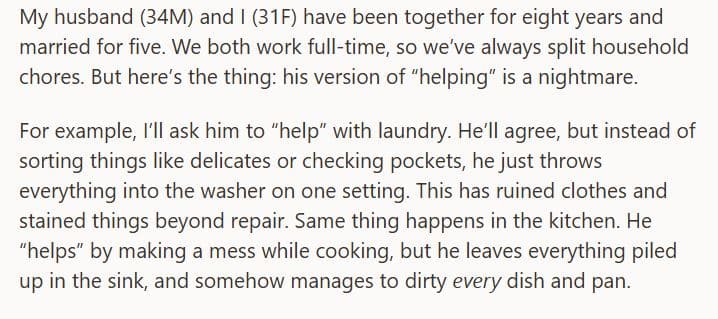The OP’s husband’s attempts to “help” around the house seem to do more harm than good. He rushes through tasks throwing laundry together without sorting, making a mess in the kitchen and “tidying” by misplacing important items like her birth control pills. Despite OP’s guidance and checklists, he resists, brushes off her frustration, and laughs off mistakes. When OP finally tells him to stop “helping” if he won’t do things properly, he becomes upset, claiming he was only trying to make things easier. Now, OP wonders if she was too harsh.
Read More: “AITA for requesting that my teacher not partner me with my deadbeat father’s daughter?”
“Transforming Household Chores from ‘Help’ to True Partnership”
It sounds like you’re dealing with a tough situation, and it’s understandable that you feel frustrated. From your description, it’s not just that he doesn’t know how to handle chores—he dismisses your input and insists he’s helping while leaving you to correct his mistakes. This may indicate “weaponized incompetence,” a behavior where someone avoids responsibilities by doing a poor job. A possible solution might be to discuss shared responsibility instead of “helping.” Framing it as an equal partnership could emphasize that household tasks are a shared commitment, not just him assisting you.



Comment Analysis:
The commenter suggests reframing the issue so your husband sees chores as a joint responsibility, not “helping.” They emphasize that he’s capable of managing these tasks if he’s willing. This is an insightful approach that could lead to him taking more ownership. I’d add that a discussion about mutual expectations can help reinforce this idea of equal partnership, hopefully removing any feelings of one-sided responsibility.


Here, the commenter raises the concept of “weaponized incompetence,” suggesting your husband might be doing a poor job on purpose so he doesn’t get asked again. While this could be true, confronting him gently about it could be effective if he’s unaware of how this affects you. Instead of accusing him, you might explain how these actions make you feel unsupported, which could help him see things from your perspective.


This commenter considers the future implications of his behavior, questioning if he’ll be reliable in other situations. It’s a valid concern, especially if you’re contemplating long-term plans together. Rather than viewing it as a sign of incompatibility, consider it an opportunity to discuss what mutual support looks like in your partnership. Talking openly about each other’s needs could give him a chance to step up, demonstrating the qualities you want in a lifelong partner.





One Comment
Comments are closed.